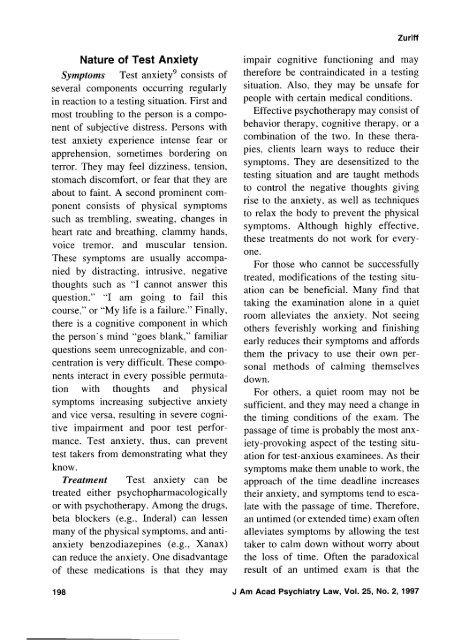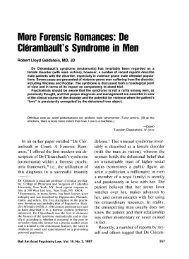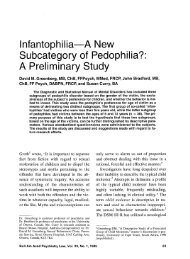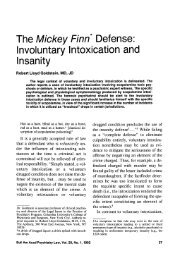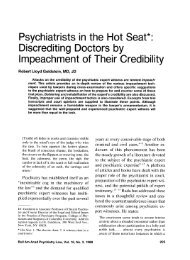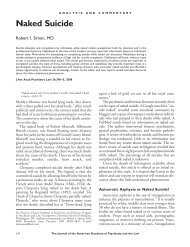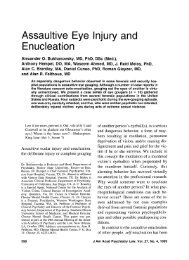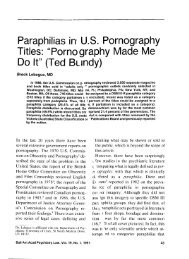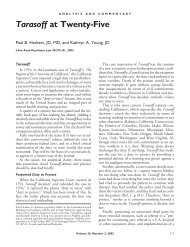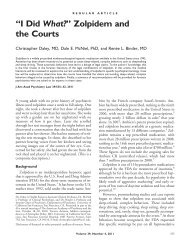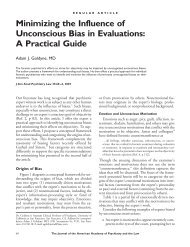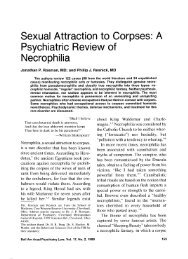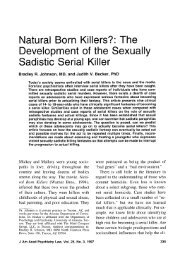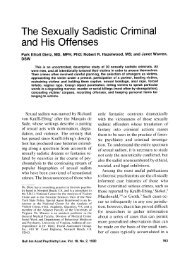Accommodations for Test Anxiety Under ADA?
Accommodations for Test Anxiety Under ADA?
Accommodations for Test Anxiety Under ADA?
Create successful ePaper yourself
Turn your PDF publications into a flip-book with our unique Google optimized e-Paper software.
Zuriff<br />
Nature of <strong>Test</strong> <strong>Anxiety</strong><br />
Symptoms <strong>Test</strong> anxiety9 consists of<br />
several components occurring regularly<br />
in reaction to a testing situation. First and<br />
most troubling to the person is a component<br />
of subjective distress. Persons with<br />
test anxiety experience intense fear or<br />
apprehension, sometimes bordering on<br />
terror. They may feel dizziness, tension,<br />
stomach discom<strong>for</strong>t, or fear that they are<br />
about to faint. A second prominent component<br />
consists of physical symptoms<br />
such as trembling, sweating, changes in<br />
heart rate and breathing, clammy hands,<br />
voice tremor, and muscular tension.<br />
These symptoms are usually accompanied<br />
by distracting, intrusive, negative<br />
thoughts such as "I cannot answer this<br />
question," "I am going to fail this<br />
course," or "My life is a failure." Finally,<br />
there is a cognitive component in which<br />
the person's mind "goes blank," familiar<br />
questions seem unrecognizable, and concentration<br />
is very difficult. These components<br />
interact in every possible permutation<br />
with thoughts and physical<br />
symptoms increasing subjective anxiety<br />
and vice versa, resulting in severe cognitive<br />
impairment and poor test per<strong>for</strong>mance.<br />
<strong>Test</strong> anxiety, thus, can prevent<br />
test takers from demonstrating what they<br />
know.<br />
Treatment <strong>Test</strong> anxiety can be<br />
treated either psychopharmacologically<br />
or with psychotherapy. Among the drugs,<br />
beta blockers (e.g., Inderal) can lessen<br />
many of the physical symptoms, and antianxiety<br />
benzodiazepines (e.g., Xanax)<br />
can reduce the anxiety. One disadvantage<br />
of these medications is that they may<br />
impair cognitive functioning and may<br />
there<strong>for</strong>e be contraindicated in a testing<br />
situation. Also, they may be unsafe <strong>for</strong><br />
people with certain medical conditions.<br />
Effective psychotherapy may consist of<br />
behavior therapy, cognitive therapy, or a<br />
combination of the two. In these therapies,<br />
clients learn ways to reduce their<br />
symptoms. They are desensitized to the<br />
testing situation and are taught methods<br />
to control the negative thoughts giving<br />
rise to the anxiety, as well as techniques<br />
to relax the body to prevent the physical<br />
symptoms. Although highly effective,<br />
these treatments do not work <strong>for</strong> everyone.<br />
For those who cannot be successfully<br />
treated, modifications of the testing situation<br />
can be beneficial. Many find that<br />
taking the examination alone in a quiet<br />
room alleviates the anxiety. Not seeing<br />
others feverishly working and finishing<br />
early reduces their symptoms and af<strong>for</strong>ds<br />
them the privacy to use their own personal<br />
methods of calming themselves<br />
down.<br />
For others, a quiet room may not be<br />
sufficient, and they may need a change in<br />
the timing conditions of the exam. The<br />
passage of time is probably the most anxiety-provoking<br />
aspect of the testing situation<br />
<strong>for</strong> test-anxious examinees. As their<br />
symptoms make them unable to work, the<br />
approach of the time deadline increases<br />
their anxiety, and symptoms tend to escalate<br />
with the passage of time. There<strong>for</strong>e,<br />
an untimed (or extended time) exam often<br />
alleviates symptoms by allowing the test<br />
taker to calm down without worry about<br />
the loss of time. Often the paradoxical<br />
result of an untimed exam is that the<br />
198 J Am Acad Psychiatry Law, Vol. 25, No. 2, 1997


